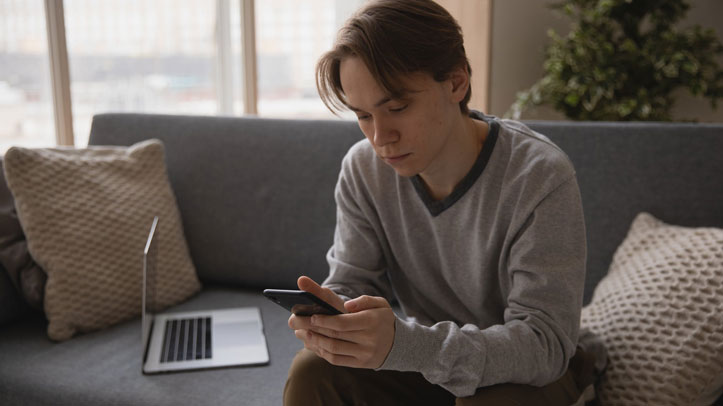
There are more than 75,000 children in care in England. Although most spent the national Covid-19 lockdown in a place of safety, this stretch of time was not without difficulty. Our ‘Childhood in the time of Covid’ report published on 29th September outlines the many new pressures on social care services during this unprecedented time and how this impacted support available to children. However, these struggles are always best understood through the lens of the children who have had to go through them.
Below we share some examples from children in care and care leavers who contacted our helpline, Help at Hand. Their situations shed light on the added complications for children who live apart from their families and who rely on state support running smoothly to live their everyday lives.
Face to face time with families
From 23rd March when the national lockdown began, Help at Hand was contacted by families in distress who were suddenly unable to see their children in-person. Often these were children in care under voluntary care orders due to their disability, who were used to frequent family visits and overnight stays at home. Many residential special schools stopped allowing face-to-face visits, moving instead to video calls which can be challenging for children, especially those with severe cognitive processing difficulties. Unfortunately, children with special educational needs and disabilities tended to be more restricted in seeing their loved ones than other children in care, because of their struggles to understand the need for social distancing.
James was living in a specialist children’s home due to his disability under a voluntary care order. Before Covid-19 he was having overnight contact with his family every other weekend and for half of the school holidays. During the lockdown he was not allowed home and could only see his family over Skype. This was really distressing for James and staff saw his behaviour change as his family time was withdrawn.
Adam was receiving palliative care in a specialist children’s home when the lockdown happened. His parents wished to see him on his birthday, especially as they feared this could be his last. The home said this was not possible and had not been open to solutions like his parents wearing PPE or only seeing Adam outside in the garden.
Claire is 2 years old and was living in a kinship placement. Before Covid-19 she was seeing her parents 4 times a week but we heard that this was stopped when lockdown started. Claire’s parents were told they would have to see Claire via video calls instead, even though Claire was too young to properly engage using this technology.
Strain on families when school support could not be accessed
In stark contrast to the above children, other children with special educational needs and disabilities were spending all their time at home with families, which presented different challenges. Several families whose children have Education, Health and Care Plans (EHCPs) reached out to Help at Hand from March onwards. Despite these children being eligible to attend school during the lockdown, some schools closed or did not have the resources to continue supporting everyone. As a result, some children did not have a school place and their parents were struggling to manage their children’s behaviour at home.
Danny has multiple learning and physical disabilities. His parents have other children to care for too. His school was open but said they did not have the capacity to have him. His parents contacted Help at Hand as they were struggling to keep him safe at home.
Eli has severe autism. He had been excluded from school just before Covid-19. His mother was having difficulty finding carers to come into the home and managing Eli’s behaviour with the restrictions on play outside. She was under severe strain caring for him at home when she made contact with our service.
Uncertainty and isolation among care leavers
Our report touched on the fresh set of challenges Covid-19 brought for care leavers, with a reduction in the usual support network of care leaver groups and face-to-face catch ups with personal advisors. A survey conducted by NYAS found that 86% of care leavers felt more lonely and anxious during the lockdown and almost half (43%) had less contact with their personal advisors. Young people who contacted Help at Hand were also scared about falling ill and worried about who would support them if this happened.
Melissa, age 23, lost her job because of Covid-19 and had to apply for universal credit. She was living on her own and worried about when her first payment would arrive, in case she was left without money for food. Her personal advisor had not been answering her calls or texts with requests for help.
Children in secure children’s homes
Over the lockdown we heard from children who were living in secure homes. This period was especially hard for these children who already have so many curbs on their freedom. They too had to manage without family visits or fun visits from professionals such as beauticians or entertainers.
Children in these homes were especially frustrated by national guidance which required them to isolate for in their bedrooms for 14 days when they moved to a secure home, even if they had tested negative for Covid-19. Some children told us they were not getting any fresh air outside during this fortnight and this was affecting their mental health.
What Help at Hand has done
Help at Hand provides advice and representation for children living away from home or otherwise working with children’s services, and for care leavers aged 18-25. It has intervened in all of the above cases to challenge certain decisions and secure better support and outcomes for the children and young people involved.
Over the lockdown, the Children’s Commissioner has raised issues with the Government and other bodies to bring about changes in policy. She was, for example, successful in protecting statutory duties towards care leavers and in making adopted children eligible to attend school. The Government also exempted children with SEND from the restrictions on time outside the home, based on cases which were raised with them.
Help at Hand can be contacted on:
0800 528 0731 or
[email protected]
Note: names and details have been changed for confidentiality purposes.






